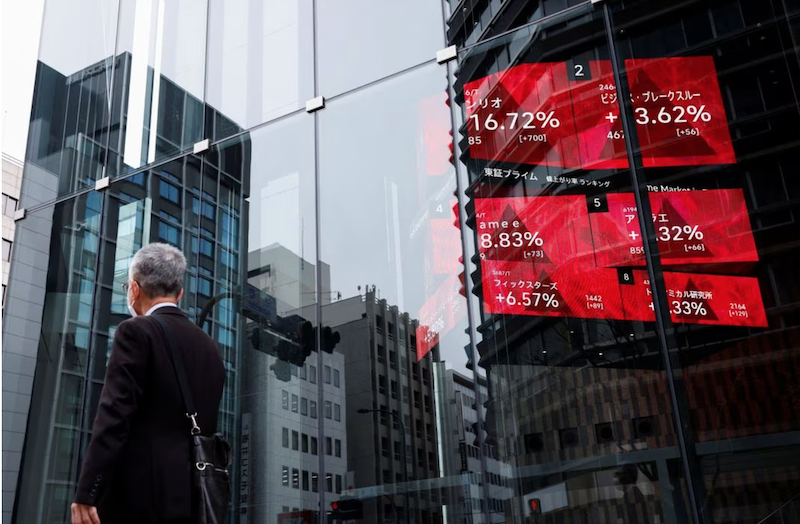Asia’s major stock indexes began the week on the front foot with trader optimism remaining high that central banks are poised to ease back on their long tightening campaigns.
Shares across the region rallied for a fourth straight session after markets priced in earlier rate cuts in the United States and Europe, though those bullish wagers will be tested by a swarm of central bank speakers this week.
Battered bond markets also enjoyed a welcome recovery as a benign US payrolls report and upbeat productivity numbers suggested the labour market there was cooling enough to scratch the need for further rate increases from the Federal Reserve.
Also on AF: China Turns Focus on Rare Earths Sector Amid Trade War with US
Japan’s Nikkei share average closed at a more than one-month high, tracking a Wall Street rally in the previous session, with chip-related stocks leading the charge.
The Nikkei index jumped 2.37% to 32,708.48, its highest closing level since September 20. The broader Topix rose 1.64% to 2,360.46.
Chip-testing equipment maker Advantest jumped 8.15% to give the biggest boost to the Nikkei. Chip-testing equipment maker Tokyo Electron rose 2.14%.
China stocks hit two-week highs and Hong Kong shares also climbed as Beijing stepped up efforts to stabilise markets, while hopes of early interest rate cuts by global central banks aided sentiment further.
Chinese mutual fund companies are rushing to buy their own stock products, as the country’s securities regulator vowed fresh measures to guide long-term capital into the stock market.
Also helping sentiment was Chinese premier Li Qiang saying on Sunday that China would further expand market access and increase imports.
China’s blue-chip CSI300 Index rose 1.35%, while the Shanghai Composite Index gained 0.91%, or 27.61 points, to 3,058.41. The Shenzhen Composite Index on China’s second exchange was ahead 2.13%, or 39.97 points, to 1,914.97.
China’s IT sector and healthcare stocks jumped 3%, while the STAR 100 Index rose 3.5%. Tech stocks in Hong Kong surged nearly 4% and the benchmark Hang Seng Index jumped 1.71%, or 302.47 points, to close at 17,966.59.
Fed Members’ Speeches
Elsewhere across the region, in earlier trade, Wellington, Manila and Jakarta were up more than 1%. There were also gains in Sydney, Singapore, Mumbai, Bangkok and Taipei. Seoul piled on more than 5% after authorities reimposed a ban on short-selling.
MSCI’s broadest index of Asia-Pacific shares outside Japan gained 2.0%, having already rallied 2.8% last week.
Globally, futures markets swung to imply a 90% chance the Fed was done raising rates, and an 86% chance the first policy easing would come as soon as June.
Central bankers have their own chance to weigh in on this dovish outlook, with at least nine Fed members speaking this week, including Chair Jerome Powell. Also on the docket are speakers from the BoE and ECB.
An odd man out is Australia’s central bank, which is considered likely to resume raising rates at a policy meeting on Tuesday as inflation stays stubbornly high.
The Bank of Japan is also on the road to tightening, albeit at a glacial pace. The head of the central bank on Monday said they were closer to achieving their inflation target but it was still not enough to end ultra-loose policy.
S&P 500 futures and Nasdaq futures were both flat. Eurostoxx 50 futures were also little moved, while FTSE futures inched up 0.1%.
Two-year Treasury yields paused at 4.86%, after falling 17 basis points last week. Yields on 10-year notes stood at 4.586%, some way from October’s painful peak of 5.021%.
US Dollar Loses Ground
The retreat in Treasury yields pulled the rug out from under the dollar, which was pinned at 105.080 having slid 1.3% last week to the lowest since late September.
The euro was firm at $1.0735, having surged 1% on Friday to its highest in two months. The dollar even lost ground to the ailing yen to stand at 149.52, some way from its recent top of 151.74.
The drop in the dollar and yields helped underpin gold at $1,983, within striking distance of the recent five-month peak of $2,009.
Oil prices edged higher, after shedding 6% last week, drawing support from confirmation Saudi Arabia and Russia would continue their additional voluntary oil output cuts.
In the Middle East, Israel on Sunday rejected growing calls for a ceasefire in Gaza, with military specialists saying that forces are set to intensify their operations against Palestinian Islamist group Hamas.
Brent added 43 cents to $85.32 a barrel, while US crude climbed 54 cents to $81.05 per barrel.
Key figures
Tokyo – Nikkei 225 > UP 2.37% at 32,708.48 (close)
Hong Kong – Hang Seng Index > UP 1.71% at 17,966.59 (close)
Shanghai – Composite > UP 0.91% at 3,058.41 (close)
London – FTSE 100 < DOWN 0.09% at 7,410.89 (0935 GMT)
New York – Dow > UP 0.66% at 34,061.32 (Friday close)
- Reuters with additional editing by Sean O’Meara
Read more:
China’s Sees First-Ever Foreign Investment Deficit in July-Sept
South Korea to Ban Short-Selling Until June 2024 Starting Monday
China to Issue More Government Bonds to Tackle Debt Crisis
Tech Stocks Lead Hang Seng Rally on Fed Rate Cut Bets
























